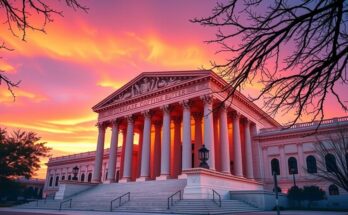Supreme Court Ruling Marks a Shift in Citizenship Controversy
In a significant turn of events, the Supreme Court has limited national injunctions related to President Trump’s controversial proposal aimed at ending automatic birthright citizenship. The decision, made public this morning, empowers the administration to proceed with its plans in states that joined the challenge as well as those that stood by silently. This ruling is not without dissent, with Justice Ketanji Brown Jackson decrying it as “an existential threat to the rule of law,” while Justice Amy Coney Barrett notably stated that courts should not overreach their powers in such cases. While the proposal inches forward, it’s still held up in New Hampshire due to a separate lawsuit not under the court’s current purview.
Senate Republicans Reassess Their Legislative Moves
Meanwhile, the Senate is experiencing a bit of disarray, as several health care provisions linked to Trump’s domestic agenda have been ruled out by the chamber’s parliamentarian. Republican senators had hoped to push through these measures in time for the upcoming Fourth of July holiday, but now they’re facing significant hurdles. The provisions in question include critical changes to Medicaid and restrictions on pharmacy benefits, which many viewed as cornerstone elements of the broader bill aimed at reshaping healthcare. With these setbacks, an air of uncertainty swirls as lawmakers scramble to regroup and rethink strategies that could salvage portions of their agenda.
Key Briefing on Iran Raises Legislative Stakes
In other news, Trump’s administration is set for a crucial closed briefing today regarding recent military actions in Iran. House members will hear from top officials about the strikes on Iranian nuclear facilities, which many believe have raised the stakes in foreign relations. The Senate will then weigh a resolution seeking to restrict military actions around Iran, ensuring any future steps require congressional approval. This debate comes amidst rising tensions and shifting political landscapes, with both parties preparing to address the implications of the administration’s actions on U.S. foreign policy and military engagement.
US-China Trade Talks Bring Modest Optimism
Across the pond, U.S. and China have, quite unexpectedly, confirmed an agreement on trade talk details that includes rare earth exports and a relaxation of tech restrictions. This surprising news comes on the heels of Trump’s claims of a new deal, though a White House official later clarified it was merely a framework for future negotiations. The ambiguity surrounding the specifics leaves many wondering how this development will ultimately play out on the world stage, especially amidst ongoing tensions between the two economic giants. Such agreements hint at a complex relationship that continues to sway under political influence despite efforts to stabilise trade operations.
Canada Seeks Answers After Detainee’s Death
Finally, Canada is demanding answers following the recent death of one of its citizens under ICE custody in Florida. Johnny Noviello was reported unresponsive during proceedings, raising serious questions about the treatment of detainees. As the investigation unfolds, Canadian officials are pushing for a detailed account from U.S. authorities regarding the circumstances that led to this tragic incident. This situation adds another layer of complexity to the ongoing dialogue on immigration policies and their human impacts, making it a sensitive topic for both nations involved.




